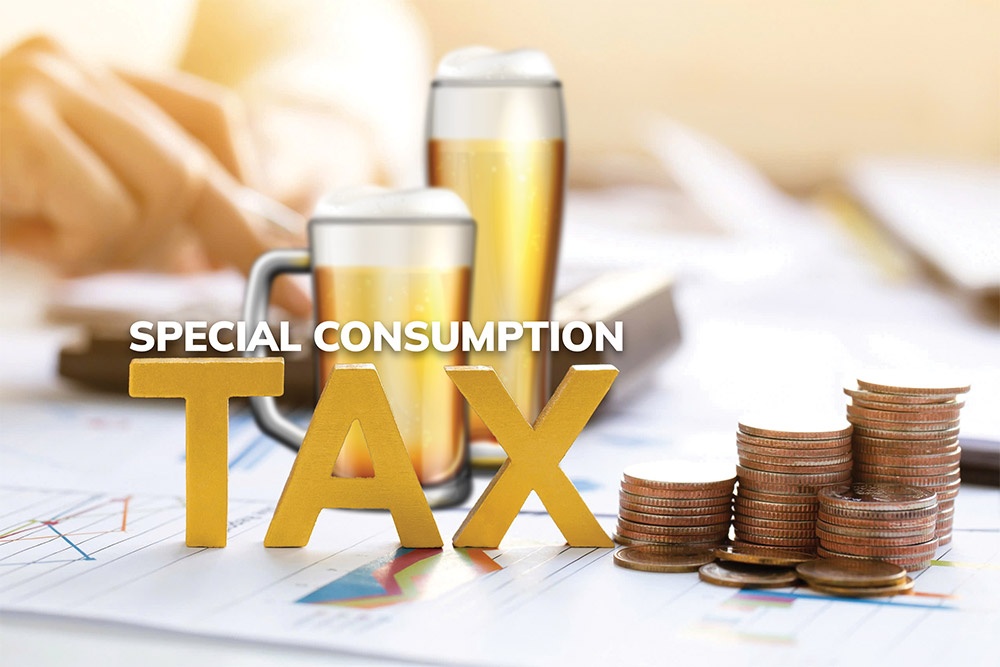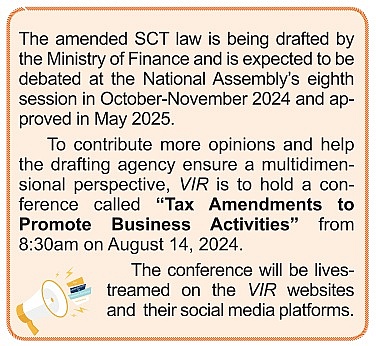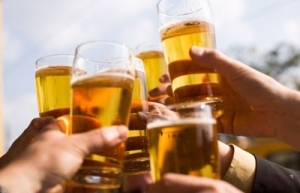Excise tax change to be considered carefully for all
Nguyen Hoang Giang, general director of Saigon Beer Trading Co., Ltd., said at a conference discussing the draft Law on Special Consumption Tax (SCT) last week that the proposal to increase taxes rapidly has made businesses in the beverage industry anxious.
 |
| Excise tax change to be considered carefully for all |
“Various global issues have disrupted the supply chain and broken the supply of raw materials. Economic sanctions, especially on energy and transportation, have also caused the price of raw materials to increase abnormally. Beer and alcohol businesses in particular are still in the recovery stage and still face many disadvantages,” Giang said.
He added that the company, which is owned by Saigon Beer-Alcohol-Beverage Corporation, supports the policy of increasing taxes from the Ministry of Finance (MoF).
“However, for the two options for consultation at this time, we need to evaluate carefully and have a roadmap. We need to consider delaying the application time, extending the progress, and reducing the tax rate increase for the alcohol industry based on a comprehensive assessment of the actual conditions in Vietnam, as well as maintaining the current relative tax calculation method,” Giang added.
Under the MoF’s draft law on SCT, it has proposed two options for increasing the tax rate on alcohol. Vietnam currently applies an excise tax on alcohol of 35-65 per cent, with beer at 65 per cent. Under the plan, the excise tax on beer will increase to 80 per cent from 2026 and towards 100 per cent by 2030.
The MoF explained that it proposed adjusting these rates following a roadmap from 2026 to 2030 to increase the retail price of these products by at least 10 per cent, according to recommendations made by the World Health Organization.
Nguyen Thanh Thuy Linh, head of Legal Compliance and Government Affairs at Carlsberg Vietnam, believes that tax increases should only take 2-3 years after the new policy is approved so that businesses can plan suitable products.
“The orientations of businesses on investment expansion or hiring more workers cannot be decided because they have to wait for the final policy to be approved. We do not know how to build future business plans,” she said.
Trinh Thi Van Giang, representative of the Wines and Spirits Subcommittee under the European Chamber of Commerce in Vietnam, said, “The tax increase would force businesses to cut numerous operating costs while the wines and spirits industry has been contributing a lot to the Vietnamese economy.”
Giang added that the industry also has to face other proposals and regulations in the coming time, such as increases in VAT, the global minimum tax, and regulations on extended responsibility of producers.
Nguyen Duc Le from the Vietnam Directorate of Market Surveillance under the Ministry of Industry and Trade said that currently 63 per cent of alcohol consumption in Vietnam (mainly home-brewed alcohol, fake alcohol, and alcohol of unknown origin) is still not managed.
“This situation not only causes concerns about the health of consumers but also causes budget losses, affects legitimate production and trading enterprises, and creates a burden for law enforcement agencies,” said Le.
 |
| Can Van Luc, chief economist, BIDV For the beverage industry, in addition to the general difficulties of all businesses, these industrial firms are struggling with their own challenges. They are not entitled to the VAT support cut policy for alcoholic beverages, they were strongly affected by the recent pandemic and the introduction of new drink-driving rules, and the price of some raw materials has risen by as much as 40 per cent. Beverage firms are also fighting against complicated smuggling and counterfeiting of wine and beer. Lifestyles and consumer behaviour have changed so much and required businesses to adapt. The business results of the entire industry have declined over the years. According to Statista, the total revenue of the Vietnamese beverage market in 2023 was about $27.12 billion, while $10 billion of this came from the non-alcoholic beverage segment; alcoholic beverages were about $17 billion. The average profit of the entire industry decreased by 12 per cent in 2021, 6 per cent in 2022, and 10-12 per cent on year in 2023. The state budget revenue of the whole industry reduced by an average of 10 per cent annually in the last three years, according to the Vietnam Beer-Alcohol-Beverage Association. The beverage industry contributes about $2.4 billion to the state budget every year, so the draft law on SCT affects not only businesses but also the state budget. This can raise state budget revenue in the short term, but it will reduce consumer demand, reduce business revenue and profits in the medium and long term. Thereby, collection of SCT and corporate income tax will go down. Moreover, increasing taxes on sugary drinks may not help reduce the rate of obesity and cardiovascular diseases, which have been caused by other reasons. Rising taxes does not help reduce pressure on the state budget to support healthcare. A sharp and rapid raise in SCT on alcoholic beverages may double difficulties for businesses and workers in the beverage industry and related industries such as packaging, transportation, tourism, and catering services. Furthermore, the draft law also provides the same level on all drinks with different alcohol concentrations. It is difficult to regulate consumer behaviour. Therefore, I recommended that the draft law should have a harmony of interests, responsibilities, and feasibility for the state, businesses, and consumers, based on carefully impact assessment, and a scientific and practical analysis. The draft should calculate the tax rate, timing, and roadmap for appropriate tax increases. The law should ensure more fairness and reasonableness by applying different tax rates on every alcohol concentration, and sugar content. Nguyen Thi Cuc, chairwoman Vietnam Tax Consultants’ Association Currently, non-alcoholic beverages and soft drinks are not subject to SCT in Vietnam. The SCT policy for alcoholic products has been changed 12 times since 1990 in terms of taxable products, rates, and alcohol concentration. The high and continuous increase in SCT may not be as effective as the target to reduce consumption of alcohol, and mitigate the harmful effects of heavy drinking on people’s health. People will be able to access smuggled goods in the premium segment, or self-make products in rural areas, which do not ensure product quality and greatly affect people’s health. We suggest the drafting committee considers further study of the impact of rapid and high tax increases on the market, production and business activities, consumers, and public health. We should consider extending the tax rate period in the roadmap so that businesses have enough time to find solutions and build plans. The SCT rate should be raised by 5 per cent in the first year, and remain there for a few years before the next adjustment, instead of SCT climbing every year in the current draft law. Additionally, it is necessary to carry out drastic measures against smuggled goods and strengthen the management of homemade alcohol without business registration, food hygiene, and safety standards, which easily cause poisonings and deaths. Bui Thi Viet Lam, country representative US-ASEAN Business Council SCT on alcoholic beverages varies greatly among countries, depending on economic, socio-cultural factors, people’s income, management policies, drinking age, import tax, and informal products. Around the world, SCT contributes to surging the state budget, orient production and consumption, and protect people’s health. Malaysia experienced a tax shock in 2014-2015 by raising SCT consecutively. The sudden and high tax increase did not help the government achieve its goals, but created negative domino effects in the market, causing loss of government revenue, factories to close, and many people to lose their jobs. The Australian government estimated a deficit of AU$170 million ($114 million) in 2023 due to the surge in alcohol tax, which not only causes a loss of budget revenue but also contributes to inflation and pressure from the cost of living. In China, import taxes on alcoholic beverages have been gradually reduced and eliminated in line with commitments in free trade agreements. It is applying a low SCT rate at 10-25 per cent. Illegal alcohol consumption accounts for about 25 per cent only. This fact shows that a reasonable tax policy helps stabilise budget revenue while reducing illegal alcoholic beverages. Alcohol tax has long been an important source of revenue for the Chinese government. In 2017, about ¥30 billion (around $4.5 billion) in excise tax was collected from the liquor industry, making it the fourth-largest contributor to total excise tax revenue that year. Thailand announced tax cuts on alcoholic beverages and entertainment venues to boost tourism. Specifically, it introduced numerous measures to boost tourism-related consumption through alcohol-related policies, including amending the SCT and simplifying the tax on wine. The Vietnamese government should refer to international experiences to apply it in a harmonious and reasonable manner suitable to the specific conditions and circumstances of the country. It is necessary to comprehensively assess the impacts on direct and indirect subjects, the economy and society to avoid negative, widespread, unwanted or even adverse effects. |
 | Alcohol, tobacco and soft drinks face increase in excise tax Alcohol, tobacco and soft drinks will be subject to an increased excise tax aiming to improve community health and tackle the national budget deficit as part of a comprehensive tax reform strategy for 2030. |
 | Beverage leaders plead for excise tax postponement Key industry players are calling for the delay of increased taxes on alcohol and sugary drinks to support business recovery and ensure they do not undermine economic growth. |
What the stars mean:
★ Poor ★ ★ Promising ★★★ Good ★★★★ Very good ★★★★★ Exceptional
Related Contents
Latest News
More News
- Masan Consumer names new deputy CEO to drive foods and beverages growth (February 23, 2026 | 20:52)
- Myriad risks ahead, but ones Vietnam can confront (February 20, 2026 | 15:02)
- Vietnam making the leap into AI and semiconductors (February 20, 2026 | 09:37)
- Funding must be activated for semiconductor success (February 20, 2026 | 09:20)
- Resilience as new benchmark for smarter infrastructure (February 19, 2026 | 20:35)
- A golden time to shine within ASEAN (February 19, 2026 | 20:22)
- Vietnam’s pivotal year for advancing sustainability (February 19, 2026 | 08:44)
- Strengthening the core role of industry and trade (February 19, 2026 | 08:35)
- Future orientations for healthcare improvements (February 19, 2026 | 08:29)
- Infrastructure orientations suitable for a new chapter (February 19, 2026 | 08:15)

 Tag:
Tag:



















 Mobile Version
Mobile Version